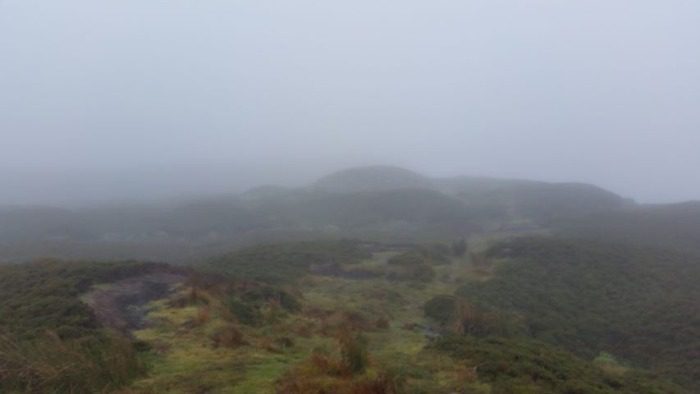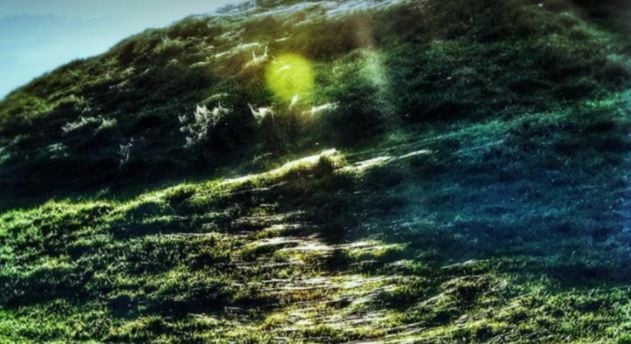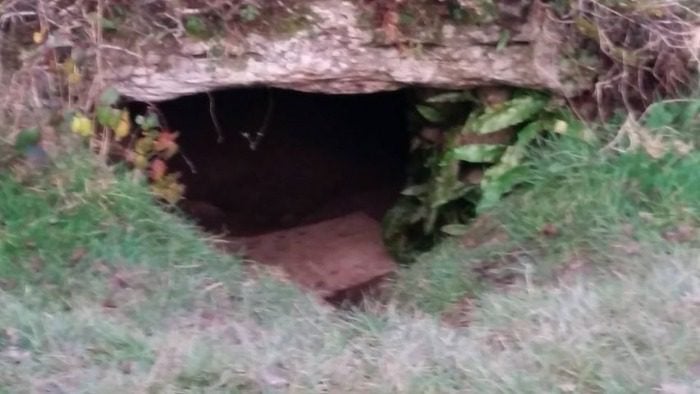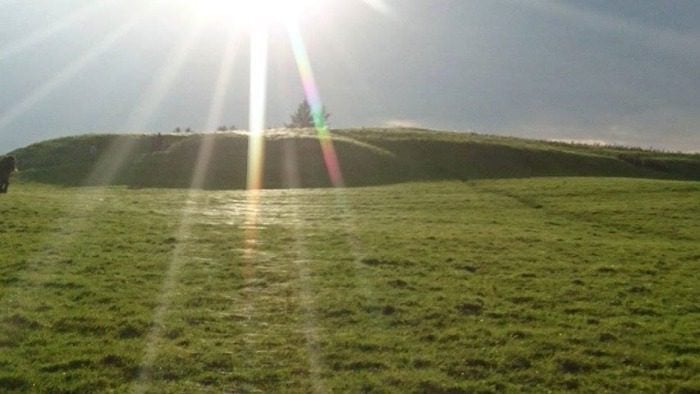There is a saying you may hear sometimes in modern paganism which comes to us from the writings of the mid-20th century poet Robert Graves: “dead, mad, or a poet”. On my last blog I talked about this phrase and how it is rooted in Welsh folklore but also has echoes in Irish and Scottish belief. To sleep in a place that belongs to the Other Crowd was to risk their anger but also to possibly earn a blessing from them, and there are some who see this in a modern context as a type of initiation practice. I thought today I’d look at it more from that angle, and then try to unpack the layers of risk, reward, and obligation that come from seeking – or at least finding – initiation through a sí.

Initiation Rites
Initiation rites are a complicated thing and when we see them discussed we are mostly looking at human designed and based rites that acknowledge a person gaining rank or acceptance into a group. Effectively then initiation marks a person’s transition from one state to another with a ritual and community acceptance. We can see a wide range of examples of this, from school graduations to ceremonies welcoming people into groups.
In some other cases however the ritual is designed to create a situation in which this transition may or may not occur, perhaps hinging on the completion of tasks or in this case on the responsiveness and response of the Gentry. The key difference, I would argue, between most types of initiations and those that might be based in seeking out the Fair Folk is that the second kind of ritual is out of human control; as with the Gods the Good People cannot be forced to give us what we want or even to show up when we want them to.
Folklore
When we look at stories of this process with the Fair Folk several things stand out immediately. Firstly, in the Irish and Scottish stories they appear to happen spontaneously, usually when a person has wandered unwittingly into (or onto) one of their places and remained into a liminal time, usually crossing the threshold of day and night. Secondly the initiation isn’t asked for or expected, in fact at least in the folklore examples when people go with the intent of getting gifts it tends to end badly.
In the Welsh material the intent is there, but with the understanding that asking to be made a poet means the very real risk of death or madness instead. This isn’t metaphor but genuine danger, and as we saw last time with the Maen Du Yr Arrdu example two were required to go in and one was promised to go mad for it. Thirdly initiation through the fairy mounds means a lifelong – perhaps longer – connection to the beings who live in those places* and it seems that they choose who they are willing to have that connection to, for their own obscure reasons.
The symbolism of the act itself is very powerful, and may perhaps be likened to a type of death and rebirth, with the person either falling asleep – and certainly sleep and death have been compared before now – or else going bodily into a place of the aos sí which is often also a place of the ancient dead. You go in as one person and that person dies in the darkness there either symbolically, psychologically, or literally. The person who emerges from the other side of this sort of initiation is someone else, someone touched directly and deeply by the Otherworld for good or ill.

Value and Risk
Why would a person seek out this kind of initiation, or accept it if it seemed to be happening spontaneously? In the folklore we see people who were granted physical healing or great gifts afterwards, particularly poetic or musical skill, or even the gift of prophecy. For witches who are already on a path that is closely aligned with or connected to the Fair Folk there may also be some appeal in this idea, and we see examples in books like Willby’s Cunning Folk and Familiar Spirits of those witches who swore themselves to the fairies being taught herbal information, healing skills, and magical knowledge.
Usually these are people who have nothing to lose or are in times of crisis, people already outside society in some way, or people who are chosen by the Gentry for their own reasons. It might be argued that those who were willing to risk death or madness saw the danger as no worse than what they already faced in daily life, and the reward as worth any risk.
A Modern Initiation Through the Sidhe
Let me tell you a story about a modern person and an initiation in and through a sí.
This person didn’t choose to set these things in motion – just the opposite in fact. They had intended something else entirely. But the Daoine Uaisle have their own agenda and sometimes all it takes to begin a thing is to set foot in a place, and so that is where our story begins, with a person walking up to the top of an iron age fort, one foot after another.
They walked up with a group of people, following a guide, to the top of a place that once belonged to Queen Medb of Connacht. The grass of the hill was white-green, coated with innumerable tiny spiderwebs, and here and there among the webs brown mushrooms jutted up. At the top of the mound the group was meant to meditate to connect to Queen Medb but that is not what happened for this person, and they found themselves instead connecting to the sí. And when it came time to leave the mound they found that the way down, what the guide described as the path of the living, was physically barred to them and they had to go down a different way, alone, following the path of the dead. And that was the beginning of their initiation, although they didn’t know it yet.

From there they went immediately to the sí of Cruachan, known now by a different name; a triangular hole within the earth that can be entered and crawled through, then walked in. Stone and earth and clay and water, and most of all a consuming darkness when the torches are turned off. The group the person was with had all gone into the cave, and by chance or not they went in at sunset, as the day went down to night. The person moved down the passage until it opened up in the main chamber then crossed the sucking mud and climbed to perch at the far end, up above the floor of the enclosure and closest to the now collapsed end that, stories say, had once gone back further. In that darkness there was only the drip of water and the shifting sounds of bodies and breathing, and then the person had an aisling, a vision.
They saw the sí of Cruachan opening up behind them, a great golden hall full of music and laughter and warmth. And what happened after that really can’t be relayed in words without sounding trite or foolish, but it can be said that the person was willing to die to reach that shining hall and they would have tried despite the darkness and the rocks slick with wet clay. They would have gladly broken their neck because in that moment death was a meaningless thing and all that had value in the world was that golden entrance and the promise of that light and laughter. But everything has a price and the price this time was remaining in the mortal world to do the work that needed to be done.
Emerging from the sí, from the cave, the person was definitely changed but they still didn’t understand the nature of this change. Understanding didn’t come until the next night, which – again by chance or design – was both the dark moon and Samhain. Then they stood in human ritual space in a third sacred place, surrounded now by firelight and stars, and a human priestess who knew nothing of what had been going on publicly gave them a title that acknowledged this initiation.
Everything that had been set in motion came full circle without the guidance of any human hand. This initiation though was more than just a symbolic acknowledgement of a rite of passage and although the person didn’t come out the other side ‘dead, mad, or a poet‘ they did emerge deeply and profoundly changed, carrying geasa*, and with their entire spiritual life re-routed. On the other hand, perhaps we could say in a way they did die, as the person they were before they entered that sidhe never emerged again, and perhaps we could argue that madness is in the eye of the beholder as is poetry.

Counting the Cost
And so in this story we see a confluence of timing and places, and of an initiation through the agency of the aos sí and not through human planning. This is only one modern example of this kind of initiation and there are other stories that could be told of similar ones that ended less well, because we can’t forget that emerging alive and successful – by any measure – is only one possible outcome. Could such an initiation be planned and attempted? There’s no reason why not, but it should be remembered that simply going to a sí at a liminal time or day isn’t any guarantee that anything will occur. It might be fair to say that rather than the neat trifecta of ‘dead, mad, or a poet’ that Graves gave us it would be more accurate to say that seeking such gifts through the aos sí could result in death, madness, inspiration, transformation, or nothing at all. And perhaps the nothing at all would be the most painful.
It should also be kept in mind that all things to do with the Daoine Uaisle have a price, whether that price is the risk of death and madness, being haunted forever by the sound of fairy music, or living a life bound to their service. This is not the sort of initiation one pursues lightly or without fully grasping the risks and the cost, which of course you won’t know until you are already given over to the cold ground and the spirits housed there.
Life long connections to these beings is a serious matter that should not be entered into by choice without some serious consideration, although as we’ve established sometimes our choice isn’t what begins the process. Death and madness are real consequences of seeking this out, but even if the third option is successfully gained one should not underestimate the way it will change you. And it will change you – not just in some slight ephemeral way, not just deeply and profoundly, but literally, physically change you. It takes courage to brave the dying light of sunset and risk giving one’s self over to the aos sí in the darkness, but it also takes courage to step back out into the light again afterwards and move forward into a life that will never entirely belong to you again.
I’d like to end this article with this, a link to a song by a band called Green Mistletoe. The song – ‘Fairies’ Reward‘ – is something that I collaborated with the band on; I wrote the lyrics based on the subject matter we’ve been discussing here and the band turned those words into a song. I think it encapsulates my feelings on this subject very well, through the medium of Green Mistletoe’s talent.
*I have discussed this before of course but it bears repeating that the aos sí are not twee little garden fairies as the Victorian imagination would paint them. Healthy fear of them is wise.
*Geasa – singular geis – are a type of sacred prohibition, actions that either must be taken or must not be taken to ensure a person’s luck. To break a geis is to invite Otherworldy retribution and doom.

















